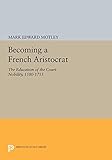Becoming a French Aristocrat : The Education of the Court Nobility, 1580-1715 / Mark Edward Motley.
Material type: TextSeries: Princeton Legacy Library ; 1102Publisher: Princeton, NJ : Princeton University Press, [2014]Copyright date: ©1990Edition: Course BookDescription: 1 online resource (252 p.)Content type:
TextSeries: Princeton Legacy Library ; 1102Publisher: Princeton, NJ : Princeton University Press, [2014]Copyright date: ©1990Edition: Course BookDescription: 1 online resource (252 p.)Content type: - 9780691602905
- 9781400861224
- 371.9
- LC4945.F7 -- M68 1990eb
- online - DeGruyter
- Issued also in print.
| Item type | Current library | Call number | URL | Status | Notes | Barcode | |
|---|---|---|---|---|---|---|---|
 eBook
eBook
|
Biblioteca "Angelicum" Pont. Univ. S.Tommaso d'Aquino Nuvola online | online - DeGruyter (Browse shelf(Opens below)) | Online access | Not for loan (Accesso limitato) | Accesso per gli utenti autorizzati / Access for authorized users | (dgr)9781400861224 |
Frontmatter -- Contents -- Acknowledgments -- Principal Abbreviations -- Introduction -- Chapter One: Family and Household Education -- Chapter Two: Language and Letters -- Chapter Three: The Academy -- Chapter Four: Entering the World -- Conclusion -- Bibliography -- Index
restricted access online access with authorization star
http://purl.org/coar/access_right/c_16ec
Focusing on the highest-ranking segment of the nobility, Mark Motley examines why a social group whose very essence was based on hereditary status would need or seek instruction and training for its young. As the "warrior nobility" adopted the courtly life epitomized by Versailles--with its code of etiquette and sensitivity to language and demeanor--education became more than a vehicle for professional training. Education, Motley argues, played both the conservative role of promoting assertions of "natural" superiority appropriate to a hereditary aristocracy, and the more dynamic role of fostering cultural changes that helped it maintain its power in a changing world.Based on such sources as family papers and correspondence, memoirs, and pedagogical treatises, this book explores education as it took place in the household, in secondary schools and riding academies, and at court and in the army. It shows how such education combined deference and solidarity, language and knowledge, and ceremonial behavior and festive disorder. In so doing, this work contends that education was an integral part of the aristocracy's response to absolutism in the French monarchy.Originally published in 1990.The Princeton Legacy Library uses the latest print-on-demand technology to again make available previously out-of-print books from the distinguished backlist of Princeton University Press. These editions preserve the original texts of these important books while presenting them in durable paperback and hardcover editions. The goal of the Princeton Legacy Library is to vastly increase access to the rich scholarly heritage found in the thousands of books published by Princeton University Press since its founding in 1905.
Issued also in print.
Mode of access: Internet via World Wide Web.
In English.
Description based on online resource; title from PDF title page (publisher's Web site, viewed 30. Aug 2021)


